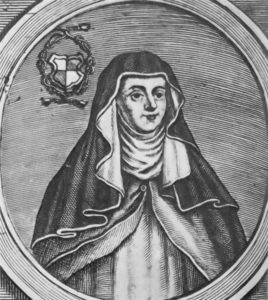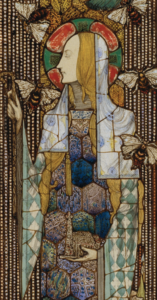Yesterday, in a surprising rout, Phillips Brooks was relegated to the O Little Town of Lent Madness Infamy, as Marguerite d'Youville trounced him 70% to 30% to advance to the Saintly Sixteen. She'll face the winner of Damien of Molokai vs. Pandita Ramabai in the next round.
But life, like Lent, moves on. And today we offer: Five syllables. Eleven consonants. Two saints. That's what you get when the Supreme Executive Committee concocts the Clash of the Consonants. Will the winning saint need to buy a vowel? We're not sure. But either Hrotsvitha or Gobnait will emerge victorious over the next 24 hours to secure her place in the Saintly Sixteen.
Hrotsvitha
 Though she’s not well known today, the tenth-century German canoness Hrotsvitha has been called “the most remarkable woman of her time.”
Though she’s not well known today, the tenth-century German canoness Hrotsvitha has been called “the most remarkable woman of her time.”
A Benedictine nun at Gandersheim Abbey in Lower Saxony, Germany, Hrotsvitha is regarded as the first female German poet and the first known female playwright. Popular YouTube channel Crash Course also has credited her with “sneaking” theater back into the Christian world.
Hrotsvitha’s plays, known as “sacred comedies,” are more dialogue than drama—likely meant to be read rather than performed, to be a Christian alternative to bawdy classical works, lest readers be “corrupted by the wickedness of the matter.” They include comedies based on the works of Roman playwright Terence, many on the theme of chastity. Crash Course host Mike Rugnetta jokingly called this “medieval slut shaming,” but he also said the emphasis on chastity suggests to modern readers it was “one of a very few ways women could wield power in the Middle Ages.”
Perhaps best known among the sacred comedies is “Gallicanus” in which the clever Constance tricks a suitor into converting and taking a vow of chastity so that she does not have to marry him. Or there’s “Dulcitius,” which tells the story of three sisters whose prayers confuse the play’s titular character so that he ends up kissing and groping pots and pans rather than the women. It ends with the women being martyred rather than renounce Christianity. Hilarious.
There’s debate over whether any of Hrotsvitha’s plays were performed during her lifetime. The earliest known performance of her work wasn’t until 1888 in Paris. As recently as 2006, a feminist theater company offered the First Annual Hrosvitha Award to any professional company that scrapped plans to produce “yet another production of a Greek tragedy” for one of hers.
Hrotsvitha also wrote narrative poems based on Christian legends, the life of Otto the Great and the history of the convent she called home. She wrote about life as a woman in the early Middle Ages. And she reinterpreted her own name, which meant “strong honor” to mean “loud cry” or “clarion call.”
Collect for Hrotsvitha
O God, you have brought us near to an innumerable company of angels, and to the spirits of just men made perfect: Grant us during our earthly pilgrimage to abide in their fellowship, and in our heavenly country to become partakers of their joy; through Jesus Christ our Lord, who lives and reigns with you and the Holy Spirit, one God, now and for ever. Amen.
Gobnait
 Gobnait is an example of those numerous individuals who could slip through the cracks of history, but the memory of their faithfulness causes them to be remembered for generations. Gobnait’s memory is preserved by the local practices and memory of the Christian communities of Ireland and passed on to us today.
Gobnait is an example of those numerous individuals who could slip through the cracks of history, but the memory of their faithfulness causes them to be remembered for generations. Gobnait’s memory is preserved by the local practices and memory of the Christian communities of Ireland and passed on to us today.
With her brother, Saint Abban, she founded a convent and served as its abbess in the sixth century. They came to that location while fleeing from violence in their home community of County Clare.
Most of the stories of Gobnait center around her protection of the community in which she lived and served.
In one account, raiders were approaching to attack the village. Gobnait sent out bees from her hives, and the bees drove off the attackers. In another tale, Gobnait walked around the village, using her staff to successfully mark a line of protection around the village from an impending plague. In still another story, a foreign invader sought to build a fortress across the valley from the convent. Every night when the workers were done, Gobnait threw a metal ball at the construction site, destroying their work each day until they left in frustration.
In her youth, Gobnait was directed to the site of the convent (Ballyvourney, County Cork) by a vision that told her that the location would be the place of her resurrection. She is buried in Ballyvourney, and every year on her feast day of February 11, pilgrims come to drink from the healing waters of her well. The cemetery in which Gobnait is buried is littered with crutches, a sign of the enduring faith in her gifts of healing.
In art, Gobnait is usually depicted along with bees. They were her companions and her charge at the convent, and their honey was likely used in medicines and cures for those who came to her for care.
Gobnait’s memory serves to remind us of how faithful service leaves a lasting impression on the communities we serve and on the world.
Collect for Gobnait
O God, by whose grace your servant Gobnait, kindled with the flame of your love, became a burning and a shining light in your church: Grant that we also may be aflame with the spirit of your love and discipline, and walk before you as children of the light; through Jesus Christ our Lord, who lives and reigns with you, in the unity of the Holy Spirit, one God, now and forever. Amen
[poll id="249"]
202 comments on “Hrotsvitha vs. Gobnait”
Off to Ireland tomorrow so the Irish challenger is my choice
Neither appear worthy.
I’ve become Svitha’s sixth YouTube subscriber.
"The Six Charisms of Hare Svitha," by Davis Dassori. Perfect timing: today is the vishnal equinox.
you had me at the bees!
Hrotsvitha suffers from a poor write up today! Who would vote for her after accusing her of slut shaming? Often, these posts make saints sound much cooler than their wikipedia page. Sadly, today's post about Hrothsvitha does the opposite.
A nun with a snarky sense of humor! Spreading her spiritual ideals with imagination and wit! And she took on the “women can’t write” trope head-on. How can I not vote for Hrosvitha. As icing on the cake, she has a setting at Judy Chicago’s “Dinner Party.” https://www.brooklynmuseum.org/eascfa/dinner_party/place_settings/hrosvitha
Hmm. Still don't find anything indicating canonization. I thought she might be in our Cloud of Witnesses, but nothing there, either. So, absent confirmation that she is indeed haloed, if not golden, I'll have to cast my vote for Gobnait. Could it be that her parents bribed the Supreme Executive Council to gain her admittance to the Round of 32? If so, should she be punished for the sins of her parents or could we give her deferred status? Would this make her truly a saint for our times?
The Irish consider her a saint - perhaps it’s a Celtic canonization:
https://www.irishexaminer.com/lifestyle/outdoors/gardening/st-gobnait--the-patron-saint-of-bees-andbeekeeping-381607.html
I wasn’t clear in my reference. I meant Hrotsvitha is of dubious nomination, unless she was canonized or commemorated by some church not readily found in internet searches. At least Gobnait is winning so it’s a moot challenge.
Clearly, not all the Lent Madness competitors have been canonized.
They don't have to be canonized, but they do have to be on some church's list of commemorations. So, SEC, which church would that be?
Gobnait - nothing to support my vote other than the fact her story resonated with me. And I do love raw honey.
VOTE GOBNAIT!!!!!!!!!!!!!!!!!!!!!!!!!!!!!!!!!!!!!!!!!!!!!!!!!!!!!!!!!!!!!!!!!!!!!!!!!!!! NOW!!!!!!!
Well, the beekeeper in me just has to go for Gobnait!
As a lover of honey and a person who loves historic preservation, I voted for the beekeeping protestor against invasive construction. My husband and I plan our garden to contain many plants that support and encourage bees and other pollinators, as well as Monarch butterflies. We also sweeten our coffee and tea with honey purchased from a local farmer.
I would choose Gobnait for the image alone. Its incredible!
Voted for Hrosvitha, the pots and pans is hilarious, she just sounds more real.
Gobnait, , because of the bees.
Gobnait is the one! A beekeeper installed 2 hives on St. Alban's property last year, which were meant for bee propagation only. Gobnait must have blessed the project, because the bees liked our acreage so much, they produced two harvests of honey.
Sung to the John Lennon tune: "All we are saying, is give bees a chance!"
Love those pollinators, but I'll vote for Hrotsvitha because she has so many more consonants in her name that I feel for her.
“Abigail or Deborah are Englis versions of her name.”
More info:
https://www.irishexaminer.com/lifestyle/outdoors/gardening/st-gobnait--the-patron-saint-of-bees-andbeekeeping-381607.html
Today's matchup is representative one of the best things about Lent Madness. Two faithful women brought out of obscurity onto the stage of Lent Madness. I just love learning about people who otherwise I probably never would have heard of. Both women contributed to their communities in creative ways, but I went with Gobnait today primarily because of her work with bees, her Irish heritage, and her determination to protect her community from forces that would destroy it. I wonder if that metal ball is still available...
My mother’s people are from Ballyvourney. Gobnait for the win!
I voted for Gobnait. The line in the sand protecting from illness and the bee whispering makes her sound like a cool Irish witch.
I've been flip-flopping all day: vote for Hrotsvitha in honor of the Rev. Becca Stevens or vote for Gobnait in honor ot Thistle Farms? Still haven't decided.
Assuming Gobnait goes on to victory could the SEC not fix it so she could meet St. Peter in the next round? I would love to see the keeper of the keys meet the keeper of the bees!
Had to vote for Gobnait. It was the bees! One of my favorite novels is The Secret Life of Bees. Love its depiction of women's spirituality,
I voted for Gobnait because we need bees, because she (and they) protected the community, and because God healed people through her.
I believe you, Nell, but alas--I don't possess that sweet, soft Irish accent, so my imagination is limited in such sounds. Hrotsvitha is too unpronounceable to even remind me of any word at all, so I just went with her because she sanctified the bawdy!
Love the theater but have to vote for Gobnait because one of my ancestral line goes back to County Clare.
Gobnait because her name. And bees!
I'm voting for Gobnait, in recognition of the witness and impact of early Celtic Christianity, and in thankful memory of my recent visits to County Clare and County Cork. And, I must say, that is a lovely work of art representing Gobnait- don't know if it's a stained glass window, but it looks like one.
I cannot get down for anyone who writes about "tricking" someone into conversion. So, my vote goes to Gobnait.
In which play did Hrosvitha write of tricking someone into converting?